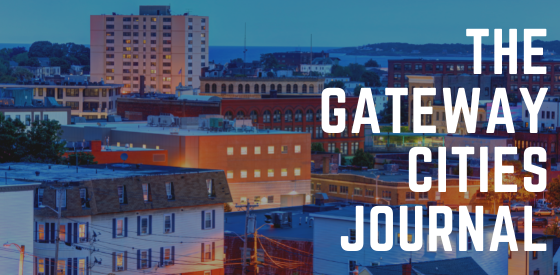A few days after MassINC unveiled a new report on the crucial role of social infrastructure for urban vitality and resilience, Groundwork Lawrence brought the concept to life at its annual Glow Gala. The event took place in Youth Development Organization’s new space at Everett Mills. The historic building spans four blocks along the edge of downtown Lawrence. It houses artists, community development nonprofits, light manufacturers, and human services agencies. Strolling through the 500,000-square-foot structure’s vast hallways, you can see how it offers unique spaces that forge connection and spark creativity.
It’s easy to get a sense of how the built environment in Gateway Cities fosters social connection this time of year. At last weekend’s City of Lights Festival, Lowellians paraded down historic Merrimack Street, patronizing the local shops participating in the event’s hot chocolate contest. On Monday, the Bright Night Road Race brought 400 runners to a 5K course through Springfield’s 735-acre Forest Park, one of the largest urban parks in the country.
Unfortunately, these civic events, and the civic spaces that support them, are often an afterthought these days. The local papers that promoted and recorded them are disappearing, replaced by Facebook and other social media sites. These platforms could provide virtual social infrastructure, but instead they draw users to partisan content, creating fear and division by nationalizing politics and distracting attention from important community matters.
We pay less attention to the municipal garages, public parks, cultural institutions, and main street businesses that bring people together and create community. Meanwhile, a growing body of research reveals how this social infrastructure keeps us happy, healthy, and resilient in the face of unforeseen challenges.
As Gateway City leaders deploy federal recovery and infrastructure funds, they have a unique opening to make investments that enhance social infrastructure. Similarly, the Baker administration can employ this frame with its final set of legacy investments. As they assume control of capital programs and establish post-pandemic priorities for state investment, the incoming Healey-Driscoll team can encourage agencies to evaluate projects through this lens.
Gateway City legislators also have a central role to play in advancing policies that help their communities develop and leverage social infrastructure. This means tackling longstanding parking and mobility issues, which are fundamental to creating dense urban spaces that accommodate human interaction. Creating stronger place governance structures, such as business improvement districts, cultural districts, and parking benefit districts, is also vital. In an age where remote work gives people more freedom than ever to choose where they live and pass their time, place governance will be essential.
With thoughtful attention to social infrastructure, Massachusetts can ensure that Gateway Cities neighborhoods and commercial areas bustle with vibrancy all throughout the year.
